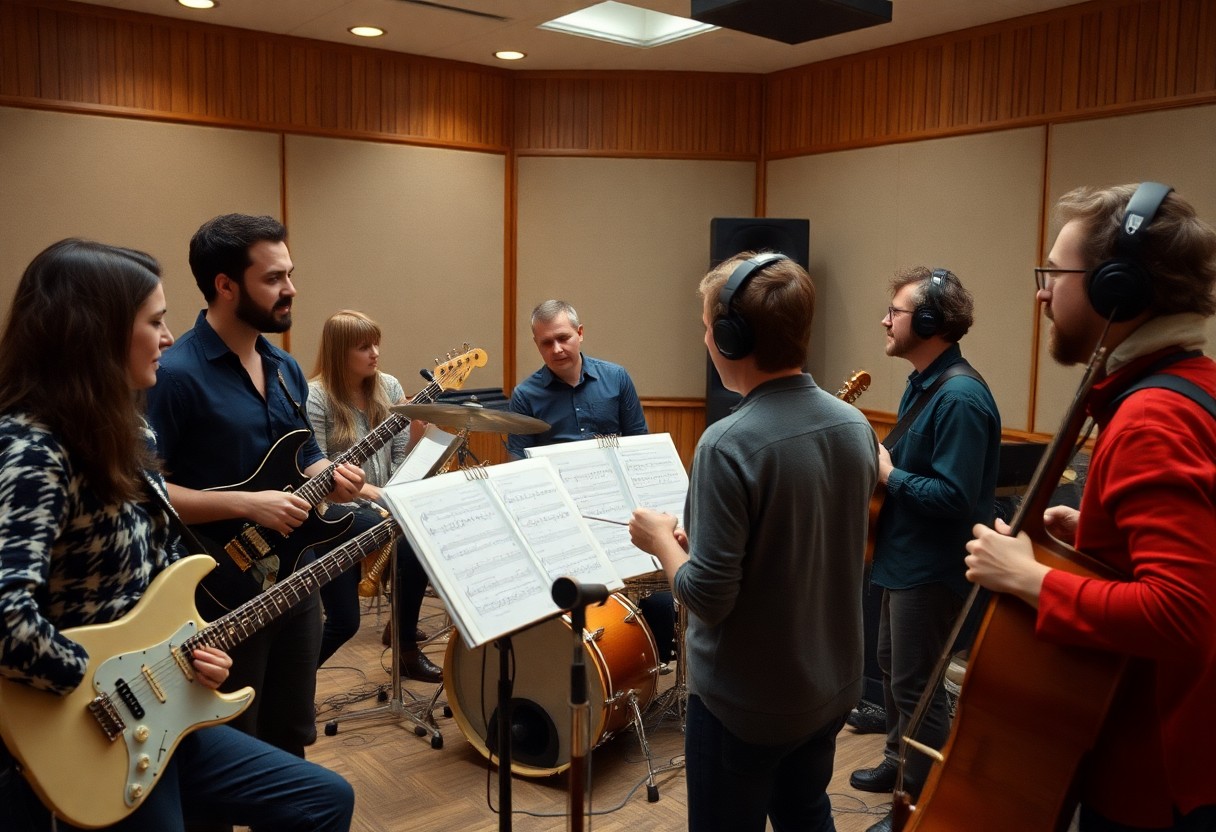Collaboration is the backbone of any successful band, enabling you to blend your unique talents and ideas. To ensure your musical journey is both productive and harmonious, you should prioritize open communication and embrace constructive feedback. This synergy can lead to extraordinary creative outputs, but beware of ego clashes that may hinder progress. By fostering a culture of respect and compromise, you can create an environment where everyone feels valued, ultimately enhancing your collective sound and performance. Let’s explore vital tips to elevate your collaboration skills and strengthen your band dynamic.
Key Takeaways:
- Effective communication is crucial; establish open dialogue among band members.
- Value each member’s contributions and encourage diverse ideas to foster creativity.
- Set clear roles and expectations to streamline collaboration and avoid confusion.
- Practice active listening; this builds trust and strengthens relationships within the band.
- Be adaptable and willing to compromise to find a harmonious balance in decision-making.
- Schedule regular check-ins to assess progress and address any concerns collectively.
- Celebrate successes together, reinforcing team spirit and motivation to continue creating.
Establishing Band Dynamics
Before you can create music that resonates, it’s imperative to establish solid band dynamics. This foundation not only enhances collaboration but also fosters an environment where creativity can flourish. Understanding each member’s strengths and weaknesses is key to building effective interactions. Keep in mind, the band’s chemistry will directly influence how you create, perform, and connect with your audience.
Defining Roles and Responsibilities
Between every band member, it’s vital to clearly define roles and responsibilities to minimize confusion. Whether you’re the guitarist, vocalist, or drummer, knowing your specific duties will not only streamline your practice sessions but also enhance your collective output. Discuss who takes lead on songwriting, managing schedules, or handling finances to ensure everyone knows their contributions.
Creating a Communication Framework
One of the most important elements to successful collaboration is establishing a communication framework. By agreeing on how you will share ideas, resolve conflicts, and discuss feedback, you are setting the stage for a harmonious working relationship.
Due to the fast-paced nature of band dynamics, effective communication can prevent misunderstandings and disputes. Use group chats, regular meetings, and shared apps to ensure that everyone is on the same page. Cultivating an atmosphere where open dialogue is encouraged will not only enhance your workflow but also strengthen personal bonds. Keep in mind, communicating positively can inspire creativity and lift the group’s morale—leading to a more productive artistic journey.
Creative Process
If you want to harness the full potential of your band’s creative process, it’s necessary to cultivate an environment of open communication and trust. Ensure each member feels comfortable sharing their ideas and perspectives, as this openness can spark innovative concepts and elevate your collaborative efforts. Regular brainstorming sessions can also help keep creativity flowing and foster a sense of collective ownership over your music.
Songwriting as a Group
With a group approach to songwriting, you can blend individual talents to create richer, more diverse musical pieces. Explore different methods, such as passing around a song idea or collectively writing lyrics, to discover what works best for your band. By embracing this collaborative spirit, you may unlock fresh songs that resonate with your unique sound.
Arranging Music Collaboratively
The process of arranging music together can be a rewarding experience, as it allows you to combine your distinct musical styles into a harmonious composition. Sharing roles—such as assigning someone to handle the rhythm section while others focus on melody—can enhance your overall sound. Ensure all members contribute their input to create a balanced arrangement that reflects your group’s artistic vision.
Creative arrangements often require experimentation and flexibility. You might find that some ideas resonate better than others, and it’s important to embrace these moments. Collaborative arrangements can lead to unexpected breakthroughs and enhance your band’s chemistry. Be open to revisiting sections or trying out new instruments to develop your pieces further. Using a digital audio workstation (DAW) for collaborative editing can facilitate real-time feedback, making the process more efficient and enjoyable. Ultimately, when you work together to arrange your music, you’ll create a richer, more authentic sound that showcases your talents.
Rehearsal Etiquette
Keep in mind that rehearsal etiquette sets the tone for a productive collaboration. Arriving on time, having the necessary materials prepared, and maintaining a respectful attitude towards your bandmates can significantly enhance the effectiveness of your sessions. Treat your rehearsals as a professional commitment; this dedication fosters a positive environment that enables all members to thrive.
Time Management and Scheduling
Among the most important aspects of successful rehearsals is effective time management and scheduling. Coordinating with your bandmates to establish a regular practice schedule helps everyone stay aligned and accountable, ensuring that valuable rehearsal time is utilized efficiently. Open communication regarding availability will also minimize conflicts and enhance productivity.
Productive Practice Sessions
Against distractions and unproductive habits, it’s necessary to create a focused atmosphere for practice sessions. Establish clear goals for each rehearsal, and communicate these objectives with your bandmates. This will keep everyone on track and ensure you make the most of your time together.
Due to the dynamics of group collaboration, a structured approach to productive practice sessions can make a significant difference in your band’s progress. Setting clear objectives for each session allows you to gauge your improvement over time. Implementing consistent feedback among members enhances individual skills while fostering collective growth. Additionally, curbing distractions—like limiting phone usage—helps maintain focus. Do not forget, consistent and purposeful practice not only benefits your performance but also strengthens the bond within your group, making your musical journey more enjoyable and rewarding.
Conflict Resolution
Despite the inevitable challenges that arise in any creative partnership, mastering conflict resolution is key to maintaining harmony within your band. When tensions flare, it’s important to approach these situations with an open mind and heart, prioritizing communication. Acknowledging the feelings and perspectives of your fellow members promotes a healthier environment and fosters a sense of camaraderie.
Addressing Creative Differences
One of the most common sources of conflict within a band is creative differences. When ideas clash, try to view each perspective as an opportunity for growth rather than a point of contention. Open discussions about individual visions can lead to innovative results that blend everyone’s talents seamlessly.
Managing Personal Disagreements
Before entering into personal disputes, it’s vital to establish a strong foundation of trust within your group. Ensure that all members feel safe expressing their emotions and opinions. This creates room for understanding and a willingness to compromise.
Another effective strategy for managing personal disagreements is to initiate one-on-one conversations. Address conflicts privately and focus on the issue at hand rather than making personal attacks. This allows both parties to express themselves without feeling attacked or defensive. Acknowledging each other’s feelings goes a long way toward maintaining respect. If tensions escalate, consider seeking the guidance of a neutral third party who can mediate the discussion. Prioritizing mutual respect can transform potential conflicts into opportunities for deeper connections and collaboration.
Professional Development
All band members should prioritize professional development, as it strengthens not just the group, but each individual as well. Investing time in skill enhancement and understanding the music industry can lead to greater collaboration and more polished performances. This commitment elevates your artistry and sets a strong foundation for your band’s success.
Setting Common Goals
After establishing a clear vision, you and your bandmates should set common goals that align with your aspirations. This shared purpose fosters accountability and motivates everyone to work together towards achieving collective milestones, enhancing both creativity and productivity within the group.
Growth as Individual Musicians
Along your journey together, it is necessary for you to focus on growth as individual musicians. This growth not only helps you refine your skills but also contributes to the overall synergy of the band. Each member’s development leads to richer collaborations, new ideas, and innovative sounds.
Due to the dynamic nature of the music industry, it is vital that you remain committed to your individual growth. Investing in your craft means seeking out new experiences—taking lessons, attending workshops, or exploring different genres. By doing so, you enhance your technical ability and artistic expression while bringing fresh perspectives to the group. This collaborative atmosphere can result in innovative songwriting and groundbreaking performances that set your band apart from others. Embrace your uniqueness and contribute positively to your collective journey.
Business Aspects
Your band’s success hinges not just on creativity but also on effective business management. Understanding the logistics of your music career—agreements, finances, and day-to-day operations—is vital for longevity in the industry. By addressing these elements collectively, you can foster a professional environment that enables everyone to thrive both artistically and financially.
Financial Management
By keeping track of revenue and expenses, you can maintain the health of your band’s finances. Ensure that funds generated from performances, merchandise sales, and streaming are clearly documented. Regularly assess your budget and strive for transparency among band members to avoid misunderstandings and potential disputes.
Decision-Making Protocols
About how your band makes decisions can significantly influence your dynamics and productivity. Establishing clear protocols ensures that all voices are heard while promoting efficiency. Whether it involves song selection or tour planning, a defined process can enhance collaboration and prevent conflicts.
DecisionMaking is about creating a framework where everyone’s input is valued while promoting accountability. This may involve choosing a voting system or designating specific roles for decisions. Strongly outlined protocols can help mitigate miscommunication and prevent unwanted tension among members, leading to a more harmonious environment. Placing emphasis on collaboration and respect ensures that everyone feels part of the journey and aligned on shared goals.
To wrap up
As a reminder, effective collaboration is key to a successful band experience. By embracing clear communication, fostering mutual respect, and encouraging creative input from all members, you can enhance your collective sound and performance. Make it a point to be open to feedback, and don’t shy away from resolving conflicts amicably. Ultimately, your commitment to teamwork will not only improve your music but also strengthen your relationships within the band, paving the way for a more enjoyable and productive musical journey together.
FAQ
Q: What are some effective communication strategies for band members?
A: Effective communication is key to a successful band collaboration. Members should actively listen to each other, ensuring everyone feels heard and valued. Regular meetings can help clarify goals and align everyone’s vision. Utilizing group messaging platforms can also facilitate ongoing conversations about song ideas, schedules, and feedback. Encourage an open atmosphere where constructive criticism is welcomed, enabling creativity to flourish.
Q: How can we handle conflicts within the band?
A: Conflicts are natural in any group dynamic. To handle disagreements effectively, it is important to address issues openly and constructively. Set aside time to discuss differences calmly, focusing on finding solutions rather than assigning blame. Establishing a ‘no personal attacks’ rule during discussions can promote a positive environment. Having a neutral mediator, or even consulting an external facilitator, can also help guide the conversation towards a resolution.
Q: What role does collaboration play in the songwriting process?
A: Collaboration in songwriting can elevate the creative process by blending different styles, ideas, and perspectives. Band members should each contribute their unique talents, whether it’s lyric writing, composing melodies, or arranging. Regular jam sessions can stimulate new ideas, allowing members to spontaneously build on each other’s contributions. Additionally, trying out different collaboration techniques, such as writing in pairs or rotating leadership in songwriting tasks, can lead to exciting results.
Q: How can we maintain a balance between individual styles and the group sound?
A: Striking a balance between individual influences and the overall band sound is crucial for cohesion. Encourage each member to showcase their style during rehearsals, while also discussing how those styles can merge. Place importance on finding common ground that complements each member’s strengths. Regular feedback sessions can help shape a unified sound while preserving individuality, ensuring that the music feels authentic to all involved.
Q: What are some tips for staying organized and on schedule as a band?
A: Staying organized is vital for managing rehearsals, gigs, and project deadlines. Utilize digital tools like calendar apps to schedule regular practices and important milestones. Creating a shared document where band members can input their availability can help in planning sessions that accommodate everyone’s schedule. To stay on track, consider assigning roles, such as a tour manager or a timekeeper during rehearsals, to streamline responsibilities and keep everyone accountable.









